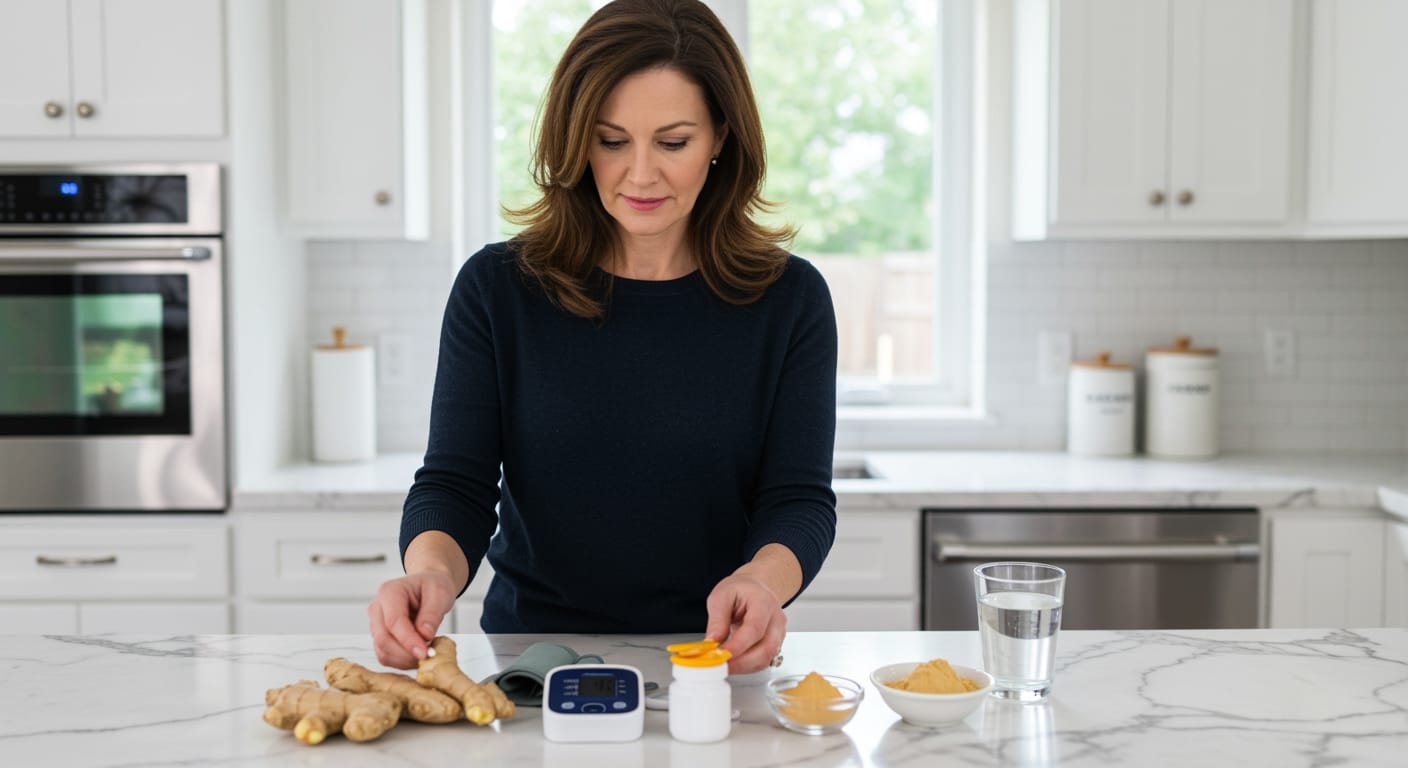✪ Key Takeaway: Ginger is generally safe for high blood pressure patients but may interact with medications and require dosage monitoring.
Introduction
Your doctor just told you to watch your blood pressure, and now you are questioning every spice in your kitchen cabinet.
You might be wondering if that ginger tea you love or the fresh ginger you add to your meals could be affecting your blood pressure readings.
Hi, I am Abdur, your nutrition coach, and today I am going to explain everything you need to know about ginger safety for high blood pressure patients.
Does Ginger Actually Lower Blood Pressure?
Research shows that ginger can indeed help lower blood pressure through several mechanisms in your body.
The active compounds in ginger, called gingerols and shogaols, work by blocking calcium channels in your blood vessel walls.
When these calcium channels are blocked, your blood vessels relax and widen, which naturally reduces the pressure against your artery walls.
Studies have found that people who consumed ginger regularly experienced an average reduction of 6.36 mmHg in systolic blood pressure and 2.12 mmHg in diastolic blood pressure.
Your body also benefits from ginger’s ability to improve blood circulation and reduce inflammation in your cardiovascular system.
The anti-inflammatory properties help protect your blood vessels from damage that can contribute to high blood pressure over time.
✪ Fact: Ginger contains over 400 bioactive compounds that contribute to its cardiovascular benefits.
Can Ginger Interact With Blood Pressure Medications?
The biggest concern for high blood pressure patients is that ginger can amplify the effects of certain medications.
If you are taking ACE inhibitors, beta-blockers, or calcium channel blockers, ginger might cause your blood pressure to drop too low.
This happens because both your medication and ginger are working to lower blood pressure through similar pathways in your body.
Blood thinning medications like warfarin pose another risk when combined with ginger because both substances affect your blood clotting mechanisms.
Your liver processes both ginger compounds and many medications through the same enzyme systems, which can lead to unexpected interactions.
Always consult your doctor before adding ginger supplements to your routine, especially if you are on multiple medications.
✪ Pro Tip: Keep a food and symptom diary to track how ginger affects your blood pressure readings.
What Is the Safe Amount of Ginger for High Blood Pressure?
Most research suggests that 1 to 3 grams of dried ginger per day is safe for most people with high blood pressure.
This translates to about one teaspoon of fresh ginger or half a teaspoon of dried ginger powder daily.
Your body absorbs ginger compounds differently depending on how you consume them, with fresh ginger being gentler than concentrated supplements.
Starting with smaller amounts allows your body to adjust gradually and helps you monitor any changes in your blood pressure.
Higher doses above 4 grams per day may cause side effects like heartburn, diarrhea, or excessive blood pressure reduction.
Your individual tolerance may vary based on your current medications, overall health status, and sensitivity to spices.
✪ Note: Fresh ginger is generally safer than supplements because it provides more controlled dosing.
Are There Any Warning Signs to Watch For?
Pay attention to symptoms that might indicate your blood pressure is dropping too low after consuming ginger.
Dizziness, lightheadedness, or feeling faint when standing up could signal that ginger is lowering your blood pressure excessively.
Unusual fatigue, weakness, or confusion may also indicate that your blood pressure has dropped below normal levels.
Some people experience increased bleeding or bruising when ginger interacts with their blood pressure medications.
Your heart rate might also change if ginger is affecting your cardiovascular system more than expected.
Regular blood pressure monitoring becomes even more important when you add ginger to your daily routine.
Stop using ginger immediately and contact your healthcare provider if you experience any concerning symptoms.
✪ Pro Tip: Monitor your blood pressure for two weeks after starting ginger to establish your personal response pattern.
The Bottom Line
Ginger can be a safe and beneficial addition to your diet if you have high blood pressure, but it requires careful consideration and monitoring.
Natural does not always mean harmless, especially when medications are involved.
I would love to hear about your experiences with ginger and blood pressure management, so please share your thoughts, questions, or concerns in the comments below.
References
At NutritionCrown, we use quality and credible sources to ensure our content is accurate and trustworthy. Below are the sources referenced in creating this article:
- Consensus: Does ginger lower blood pressure quickly?
- PubMed: Ginger and blood pressure effects
- PMC: Cardiovascular effects of ginger
- Wiley Online Library: Ginger supplementation and blood pressure






I started taking ginger per another article. It suggested 1/16 a teaspoon, which was apparently way too low. I take it with a teaspoon of honey, mixing it in my mouth before swallowing. Ginger is pepper hot and this helps reduce the burn. Lots of good information in this article. The only disappointment was discovering that you were not the beautiful woman in the lead picture.
Thank you for your comment, Wm.
I am so glad you found the information helpful. Your trick of using honey to manage the heat from the ginger is a great tip.
And you are right, I am not the beautiful woman in the picture. I guess my skills are more in nutrition science than in modeling.
But what truly matters is that you are taking positive steps for your health.